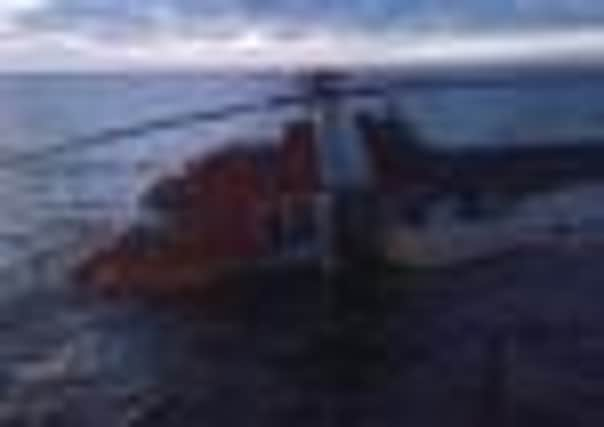Gearbox failure caused Super Puma helicopter to ditch in the North Sea


• All North Sea Super Puma flights remain suspended
• All crew on board helicopter escaped uninjured
The EC 225 aircraft was carrying an oil crew from Aberdeen to a rig 86 miles north-west of Shetland when it ditched, at about 3:30pm on Monday.
The 17 passengers and two crew were taken off their liferaft by a rescue craft launched from the vessel Nord Nightingale, which was close to the scene.
Advertisement
Hide AdAdvertisement
Hide AdThe AAIB report said a problem with the main gearbox lubrication system had caused the pilots to take action.
An investigation into another incident when a Super Puma ditched into the North Sea on 10 May found the helicopter’s gearbox had three cracks – one of them more than a foot long.
Yesterday’s report said: “The crew of the helicopter carried out a controlled ditching following indications of a failure of the main gearbox [MGB] lubrication system and, subsequently, a warning indicating failure of the emergency lubrication system.
“All passengers and crew evacuated the helicopter and were rescued without injury.”
The crew told the AAIB that lights on the helicopter’s central warning panel illuminated, indicating that all oil had drained from the main gearbox, and the emergency lubrication system, which is supposed to keep the gearbox going for 30 minutes, also failed.
An inspection of the aircraft, which was brought ashore at Peterhead harbour yesterday, found a crack on a gear shaft.
The report said: “An initial visual examination has identified a 360-degree circumferential crack on the bevel gear vertical shaft, in the vicinity of the weld that joins two sections of the shaft. Therefore, the main and stand-by oil pump gears were no longer being driven.”
In April 2009, two pilots and 14 oil workers on another version of the Super Puma, the AS332L2, crashed into the North Sea after suffering catastrophic gearbox failure.
Advertisement
Hide AdAdvertisement
Hide AdJean-Pierre Dedieu, executive vice-president of Euro-copter, the aircraft’s French manufacturer, confirmed yesterday the gearbox was the focus of the AAIB’s latest investigation.
He told The Scotsman: “We can suspect it is related to the gearbox, based on the first information and the first declaration of the pilots.
“There was a lubrication alarm, but we don’t know exactly what alarm. Our position will be clarified as soon as we have examined the parts.
“We are going to give some information to the whole fleet in the next day.”
After an emergency meeting of the oil industry’s helicopter steering group, spokesman Les Linklater said: “The operators and the companies will be seeking guarantees that these aircraft are safe to fly before we put them back in the air.”
All three of the main helicopter companies operating in the North Sea have suspended flights involving Super Pumas, leading to hundreds of oil workers being unable to get home to their families.
Jake Molloy, the regional organiser of the RMT union, said “I think the operators have erred on the side of caution, quite rightly, given the record of this particular aircraft. “We can only hope the findings of the AAIB allow a resumption of flights sooner rather than later.”